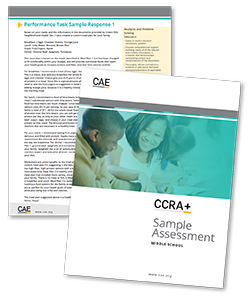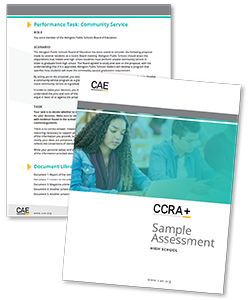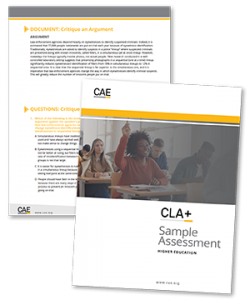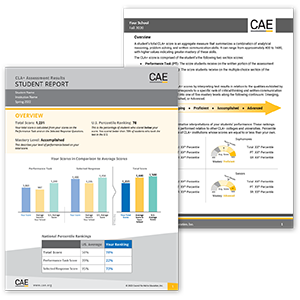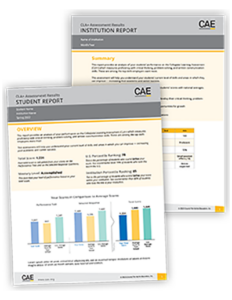Critical Thinking Assessment for Academic and Career Success
How Our Critical Thinking Assessment Works

CASE STUDY
Texas A&M University’s Mays Business School Works to Develop Students’ Essential Learning Skills with Support from CAE
Mays Business School (MBS) realized they weren’t teaching students the skills most in-demand by employers so in the fall of 2021 launched a program to strengthen these essential skills.
Students’ skills are assessed using CLA+ and CAE has worked with MBS faculty to provide critical thinking instruction to students.
Critical Thinking Assessment Samples
Multiple choice assessments can gauge students’ content knowledge but aren’t able to identify proficiency with the foundational skills that are essential to students’ college and career success — critical thinking, problem solving, and written communication. The performance-based CCRA+ and CLA+ critical thinking assessments provide insightful, nuanced evidence of students’ competencies in these areas so they can work to develop essential higher-order skills.
Take a look at these sample performance-based assessments to see how they place students in real-world scenarios and ask them to use these skills to recommend a solution.
CCRA+ — For Grades 6–12
CLA+ — For Higher Education
Actionable Data and Reports

CAE critical thinking assessment data and reports provide actionable insights into students’ areas of strength and opportunities for growth so instruction, programs, and supports can be implemented accordingly to help students develop these essential skills.
Educators can use the data-rich reports to:
- Provide instruction to build students’ critical thinking skills using CAE’s or a similar curricula
- Advise and provide guidance on attaining career goals
- Demonstrate student outcomes and success to hiring organizations through micro-credentials
Our student reports show each individual student’s strengths and opportunities for development and growth with essential skills. This data can be used as a roadmap to guide students in which skills they need to prioritize developing so they are able to achieve their future pursuits and goals.
Our institution reports provide an overview of a school or district’s scores and how they compare to CAE’s US normed sample. Educators can use this data to evaluate the specific skills and subskills that would benefit from additional development and better prepare your students for their futures.
Benefits of Our Critical Thinking Assessment
Effective solution to build students’ higher-order skills
CAE provides all the tools needed to help students build the higher-order skills they need in the workplace and in life. Our critical thinking assessments identify student strengths and opportunities for improvement in critical thinking, problem solving, and written communication. Detailed reports provide clear guidance and actionable next steps to help students develop the essential skills they will need during their academic journeys and career paths. We also provide professional development for educators to ensure they have the knowledge and support they need to teach students effectively.

Higher-order skills proficiency
CAE’s critical thinking skills assessments help students become proficient in the skills they need to succeed in college and their careers. They help students learn how to analyze problems systematically and logically, understand the connection between ideas, re-evaluate their beliefs based on facts, and be curious about the world. Our assessments also help students build confidence and resilience, articulate their thoughts, ideas, and opinions, and effectively communicate with diverse audiences.
Increased employability
Your students’ success doesn’t end at graduation — it’s only the beginning. Students who are proficient in higher-order skills are more employable and they are prepared for their careers and lifelong learning. These skills also help students be more productive and efficient in their work — characteristics that are in high demand by employers.
Learn more about our Secondary and Higher Education critical thinking assessments. Then, schedule a time to chat with us about how CAE can help you equitably prepare students for postsecondary success.

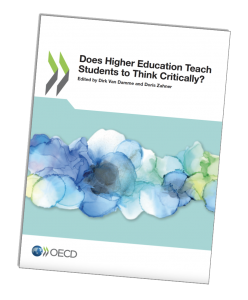 There is a growing gap between the qualifications students acquire at colleges and universities around the world and the skills employers are seeking. Often known as “soft skills” or “higher-order skills,” they include things like critical thinking, communication, problem solving, adaptability, resilience, and flexibility.
There is a growing gap between the qualifications students acquire at colleges and universities around the world and the skills employers are seeking. Often known as “soft skills” or “higher-order skills,” they include things like critical thinking, communication, problem solving, adaptability, resilience, and flexibility. 


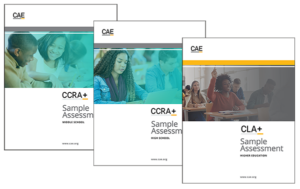
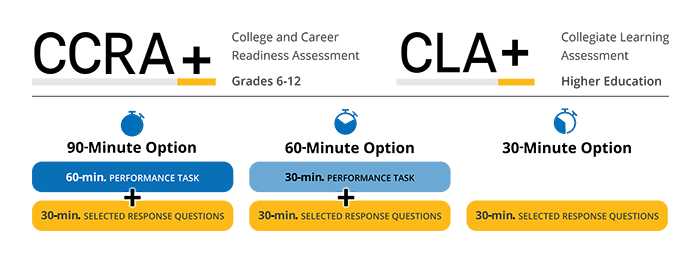
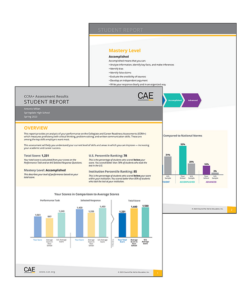 The resulting data can be used for formative and summative purposes, including evaluating how well students have developed essential skills at the beginning and/or end of a particular class or academic year, or to measure growth over multiple years.
The resulting data can be used for formative and summative purposes, including evaluating how well students have developed essential skills at the beginning and/or end of a particular class or academic year, or to measure growth over multiple years.